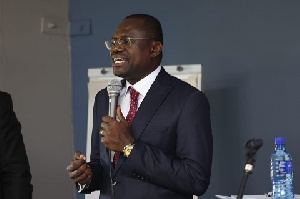Frederick William Kwasi Akuffo was born at Akropong in the Eastern Region of The Gold Coast on 21st March 1937.
In 1957 he joined the Army of the newly-independent state of Ghana and, the following year, entered Sandhurst. Commissioned into the Infantry in 1960, he was almost immediately deployed on a one-year UN peacekeeping mission in The Congo.
After the removal of British Advisors in the 1960s, the rise of the most talented Ghanaian officers to senior positions was rapid and Akuffo commanded the Airborne Training School at Tamale followed by 6th Infantry Battalion 1969-70.
After attending the National Defence College in India in 1973 Akuffo commanded 2nd Brigade. Following the 1972 military coup, all aspects of life that would have usually been the preserve of civilian organisations were run by the military. Thus, Akuffo was put in charge of ‘Operation Keep Right’ the change over from driving on the left of the road to the right. This was completed with military efficiency and was largely accident-free.
In April 1974 Akuffo became the Army Commander, succeeding fellow Sandhurst alumnus Emmanuel Erskine. The position carried automatic membership of the ruling Supreme Military Council.
In 1976, he became Chief of Defence Staff, taking over from another alumnus, Robert Kotei. After allegations of corruption and cronyism tainted the military government of General Ignatius Acheampong, Akuffo staged a bloodless palace coup on 5th July 1978 and became the 6th Head of the Republic of Ghana.
Akuffo recognised that the will of the people had to be exercised and so immediately embarked on a process to prepare Ghana for constitutional rule, scheduling presidential and parliamentary elections for 18th June 1979.
However, on 4th June, another coup this time of junior officers called the Armed Forces Revolutionary Council and led by Flight Lieutenant Jerry John Rawlings, seized power.
In what became the blueprint for African coups such as in Liberia the following year, Rawlings executed anyone who might lead the opposition to his Government in what was referred to as a ‘House Cleaning Exercise.’
After a biased and rigged show trial, with unproven charges of corruption and embezzlement, Akuffo, Acheampong and another former Head of State and alumnus Akrasi Afrifa (they had been in the same platoon at Sandhurst), together with Kotei (Sandhurst 1960), Foreign Minister Roger Felli (Sandhurst 1963), Border Guard Commander Edward Utuka (Sandhurst 1961) and the Navy and Air Force commanders were executed by firing squad at the Teshie military range.
Rawlings remained in power until 1996 when he finally handed over power to the democratically elected John Kufuor. One of the new President’s first acts was to oversee national reconciliation. The bodies of Fred Akuffo, and the other seven executed with him, were exhumed on 27th December 2001 and returned to their families for burial.
Opinions of Thursday, 24 September 2020
Columnist: Sandhurst Trust















